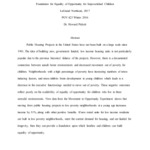Creating Locational Equilibriums: The Potential Role of Publicly Funded Housing as a Foundation for Equality of Opportunity for Impoverished Children

View/
Author
Northcutt, William L. (LeGrand)
Subject
Washington and Lee University -- Capstone in Shepherd Program for the Interdisciplinary Study of Poverty and Human Capability
Poverty
Low-income housing -- Government policy
Housing Choice Voucher Program (U.S.)
Stress in children
Metadata
Show full item recordDescription
William Northcutt is a member of the Class of 2017 of Washington and Lee University. Capstone; [FULL-TEXT FREELY AVAILABLE ONLINE] Public Housing Projects in the United States have not been built on a large scale since 1981. The idea of building new, government funded, low income housing units is not particularly popular due to the previous historical failures of the projects. However, there is a documented connection between unsafe home environments and decreased movement out of poverty for children. Neighborhoods with a high percentage of poverty have increasing numbers of stress inducing factors, and stress inhibits brain development in young children which leads to a decrease in the executive functionings needed to move out of poverty. These negative outcomes reflect poorly on the availability of equality of opportunity for children who live in these stressful environments. New data from the Movement to Opportunity Experiment shows that moving from public housing projects to low poverty neighborhoods at a young age increases income by 31%, along with other positive benefits. If new rental units for low income residents are built in low poverty neighborhoods, meet the current demand for housing, and are funded for longevity, then they can provide a foundation upon which families and children can build equality of opportunity. LeGrand Northcutt